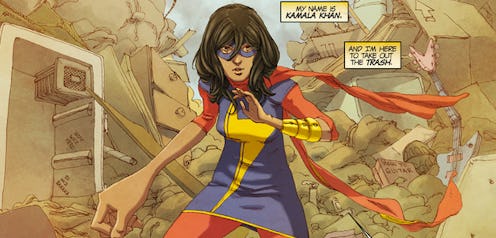Entertainment
Ms. Marvel is a Hit!

Being a woman in a comic book has, for a long time, meant either being a love interest for the hero, a victim that the hero needs to rescue, or a piece of eye candy contorted into impossible positions meant to show off the goods as much as possible. It doesn't matter how many bad guys you've just kicked in the face, it doesn't matter if you're Wonder Woman or She-Hulk: sex sells. For the unsurprisingly large female readership that comics have, that's just not good enough. Luckily, we live in a world where people are free to become more and more vocal about their dissatisfaction with the representation of women in the media and a world in which those voices can be heard by the shadowy men (it's usually men) upstairs. But while the journey to seeing more female-driven superhero media has taken a step in the right direction with the announcement Peggy Carter might be getting her own TV show at some point, when it comes to diverse leading ladies, the battle rages on.
Kamala Khan, the protagonist of a solo Ms. Marvel series that launched in February, had a lot of hopes and expectations hinging on her even before her first issue hit the shelves. Khan is not only a female carrying an entire title on her shoulders; she's a 16 year old girl from the rarely explored Muslim background whose origin story follows in the Marvel tradition of giving extraordinary powers to ordinary people. Maybe that's why her first issue sold out on the first printing and became Marvel's top digital comics seller of February.
The author of the series, G. Willow Wilson, put a lot of thought into the character. Everything from her interactions with her family, her relationship with her faith, and even her superpowers were deliberately chosen in order to tell a compelling story without resorting to stereotypes. In an interview with the Los Angeles Times, she opened up about her process and why she decided to make shapeshifting Khan's power:
Her power set was actually the toughest thing, I think, to narrow down in the character creation process. I really did not want her to have the classically girly power sets... I think a lot of these sort of passive abilities are often given to female characters – becoming invisible, using force fields. I wanted her to have something visually exciting, something kinetic…. The idea of making her a shape-shifter nicely paralleled her personal journey.
At 16, Khan's personal journey is one that resonates with a lot of people of all ages. She struggles with a sense of belonging, caused both by coming from a different background than many of her classmates and, you know, suddenly finding herself in possession of weird powers and dangerous enemies. She struggles with defining who she is, both as a person and as a hero, to the point of trying to emulate the last Ms. Marvel's costume and appearance rather than coming up with one of her own.
If any of that sounds familiar, then you're not alone. The hashtag #iammissmarvel made its rounds on Twitter, proof of how readers have embraced Kamala Khan and her story. Their story. The fact that her story is being told is proof of how far comic books have come in diversity and representation and, at the same time, it's proof of how far we have yet to go.
Image: Marvel